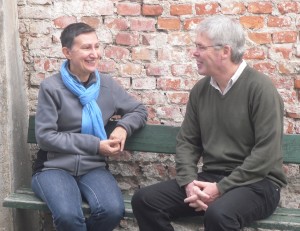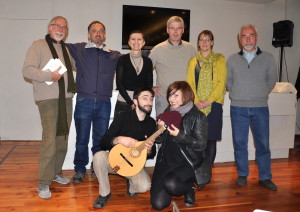 SILVIA PIO talks to the British poet:
SILVIA PIO talks to the British poet:
Question: John I. Clarke, writer, poet, retired teacher. What else?
Reading is intrinsic to all of the above. It is not possible to write poetry and not read what others have written and are writing. I tutor an adult creative writing class and they are all very nice people but if they are serious about writing then they should pick up the message about reading.
I also like walking (particularly now that my dreams of sporting superstardom have necessarily receded.) Close to where I live there are the ruins of a castle, a reservoir and a nature reserve. They are ideal places for wandering around. During the summer my wife and I spent a week in the Lake District a highlight of which was undoubtedly the superb walking country.
Walking allows for thinking time and it is no surprise to find that this feeds back into the poetry.
Q.: When did you start writing, and writing poetry?
As I remember, I picked up reading fairly easily and read a lot as a child. Writing too, is something I have done from an early age. As an eight year old I was extremely fortunate to be taught by a teacher called Mrs Procter. Writing stories was a key feature of her teaching and I reveled in it.
I don’t remember when the writing of poetry began but I do know that as a church choirboy I was surrounded by the poetry of the Bible and the hymn book. “Hills of the north rejoice!/Valleys and oceans sing.” always seemed particularly apposite.
As my school career developed I chose to study literature after the age of sixteen and this brought me into closer contact with poetry, with WB Yeats and Wilfred Owen in particular and, although they weren’t on the syllabus, I also came across Seamus Heaney and Ted Hughes who were both very influential.
I submitted my first poem to Raven, an arts magazine in 1980 and it was accepted and published. How easy could this be? Little did I know…
Q.: What is poetry for you? And writing?
Touchstones on experience.
Q.: You run workshops with young adults and adults. One of them is called Tell Your Story Loud and Proud, which is geared towards confidence, self-esteem and speaking rather than writing. Would you like to tell us about this activity?
Stories lie at the heart of who we are; where we have come from and where we aspire to be. Stories give us our bearing and direction. A life without stories, or crucially, the opportunity to tell our stories, is an impoverished one. In the telling of stories lies craft and that in turn leads to expression and art, literature and creative performance. The Loud and Proud workshop is really an attempt to give people permission to tell their stories, to liberate stories which otherwise might lie buried.
Q.: The Red Shed Poets is what has brought you to Italy. How did it start?
During my teaching days I was contacted by a former pupil who had completed his university studies in dramatic art. A performer and playwright he was now increasingly involved in poetry and the performance aspect of poetry. He sought me out because he knew that my interest in poetry had always extended beyond the classroom. At the same time, a former colleague told me that he too was investigating the possibilities of poetry. He was a talented musician and had played and performed for several groups but poetry held more interest for him. I think it is fair to say that they were both looking for a direction. I suggested that we should each contribute to a poetry booklet and hold an event to launch it. That was how Jimmy Andrex, Gareth Durasow and I came to produce Too Many Villains. We booked a venue called the Red Shed for a launch event which included a musical slot and astonished ourselves with the subsequent reception. We had stumbled across a very simple formula but it was clearly one which people were prepared to buy into. The Red Shed Readings take place on the first Thursday of the winter months and they have been running now for over five years.
Q.: This is your first time in Italy. Mondovì is not Venice or Florence, what did you expect and what do you think now that you are here? (To be answered once in Italy, of course).
I expected to find people in Mondovi have stories, like anywhere else. Once we have been here, I can speak for my wife, too, and say that we have both really enjoyed ourselves. And we are going to come back!
Thank you, John. We look forward to reading your stories and poems inspired by your stay in Italy.
See the article on the poetry reading Da Terre a Terre: https://www.margutte.com/?p=2287 https://www.margutte.com/?p=2287&lang=en and the article on John Clarke’s poetry https://www.margutte.com/?p=2093&lang=en


